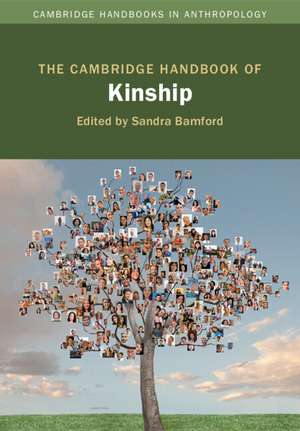The Cambridge Handbook of Kinship: Cambridge Handbooks in Anthropology
Editat de Sandra Bamforden Limba Engleză Paperback – 6 iun 2023
Preț: 297.83 lei
Nou
Puncte Express: 447
Preț estimativ în valută:
56.100€ • 59.29$ • 47.05£
56.100€ • 59.29$ • 47.05£
Carte disponibilă
Livrare economică 24 martie-07 aprilie
Livrare express 07-13 martie pentru 60.41 lei
Preluare comenzi: 021 569.72.76
Specificații
ISBN-13: 9781107697744
ISBN-10: 1107697743
Pagini: 750
Ilustrații: 6 b/w illus. 3 tables
Dimensiuni: 246 x 170 x 43 mm
Greutate: 1.18 kg
Editura: Cambridge University Press
Colecția Cambridge University Press
Seria Cambridge Handbooks in Anthropology
Locul publicării:New York, United States
ISBN-10: 1107697743
Pagini: 750
Ilustrații: 6 b/w illus. 3 tables
Dimensiuni: 246 x 170 x 43 mm
Greutate: 1.18 kg
Editura: Cambridge University Press
Colecția Cambridge University Press
Seria Cambridge Handbooks in Anthropology
Locul publicării:New York, United States
Cuprins
Introduction: 1. Conceiving kinship in the twenty-first century Sandra Bamford; Part I. Opening Frameworks: 2. The seeds of kinship theory Carol Delaney; 3. Descent in retrospect and prospect Gillian Feeley-Harnik; 4. The alliance theory of kinship in South Indian ethnography Isabelle Clark-Decès; 5. The anthropology of biology: a lesson from the new kinship. Studies Sarah Franklin; 6. The stuff of kinship Janet Carsten; Part II. The (Non)Biological Basis of Relatedness: 7. Embodied relationality beyond 'nature' vs 'nurture': materializing absent kinships in Japanese child welfare Kathryn Goldfarb; 8. Kinship in the Andes Mary Weismantel and Mary Elena Wilhoit; 9. Kinship and place: the existential and moral process of landscape formation on the Rai Coast of Papua New Guinea James Leach; 10. Adoption Christine Gailey; 11. Natural achievements: how lesbian and gay families in North America make claims to kinship Ellen Lewin; Part III. Reproducing Society: Gender, Birth and Power: 12. Kinship, knowledge and the state: the case of Argentina's adult 'living disappeared' Noa Vaisman; 13. Kinship, affliction, proximity, and unfinished healing in India Sarah Pinto; 14. Reproductive remix: law, kinship and origin stories Valerie Hartouni; 15. Selecting for sons: kinship as a product of desire Tine Gammeltoft; Part IV. Transnational Connections: 16. Maids, mistresses and wives: rethinking kinship and the domestic sphere in twenty-first-century global Hong Kong Nicole Constable; 17. Transnational adoption J. Leinaweaver; 18. Kinship in transnational encounters: Filipino migrants as 'ideal brides' in rural Japan Lieba Faier; 19. Un/making family: relatedness, migration, and displacement in a global age Deborah Boehm; 20. My folder is not a person: kinship, knowledge, biopolitics and the adoption file Eleana Kim; Part V. Technological Conceptions: 21. Surrogate motherhood and transforming families Janet DolginI; 22. Daphna Birenbaum-Carmeli, Soraya Tremayne and Zeynep Gurtin – kinship and assisted reproductive technologies: a Middle Eastern comparison Marcia Inhorn; 23. A comparison of kinship understandings among Israeli and US surrogates Elly Teman and Zsuzsa Berend; 24. Self, personhood and belonging: the role of technology in childhood disability Gail Landsman; 25. Paid and unpaid gestational labor: pregnancy and surrogacy in anthropological studies of reproduction Tsipy Ivry and Elly Teman; Part VI. Kinship and the Nation State: 26. Reading the contested forms of nation through the contested forms of kinship and marriage Susan McKinnon; 27. The prison as a technology of care in North-East Brazil Hollis Moore; 28. The interface between kinship and politics in three different social settings Signe Howell; 29. A global family: kinship, nations, and transnational organizations in Botswana's time of AIDS Koreen Reece; 30. Kinship, world religions and the nation state Fenella Cannell.
Recenzii
'Long considered one of the classic issues of comparative anthropology, kinship has sometimes been seen as an out-of-date reference to a disappearing world. More than any other recent book, this Cambridge Handbook succeeds in bringing kinship firmly back on the agenda, demonstrating the hyper-relevance of genealogical concerns and frameworks through which anthropology and related fields can fruitfully address new biosocial realities.' Gísli Pálsson, University of Iceland
'This marvelous collection of essays attests the vitality, breadth and depth of contemporary kinship studies and shows how kinship, contrary to earlier predictions of its demise, is alive and kicking. The volume brings together work from some of the most knowledgeable scholars in the field who, in consolidating their research thus far, map the state of the art and reveal not only the workings of kinship in an interconnected world, but also how it cannot be isolated from other pressing social and political questions of our time.' Jeanette Edwards, University of Manchester
'This marvelous collection of essays attests the vitality, breadth and depth of contemporary kinship studies and shows how kinship, contrary to earlier predictions of its demise, is alive and kicking. The volume brings together work from some of the most knowledgeable scholars in the field who, in consolidating their research thus far, map the state of the art and reveal not only the workings of kinship in an interconnected world, but also how it cannot be isolated from other pressing social and political questions of our time.' Jeanette Edwards, University of Manchester
Descriere
A state-of-the-field Handbook surveying the broad range of topics, approaches and theories within kinship studies today.



